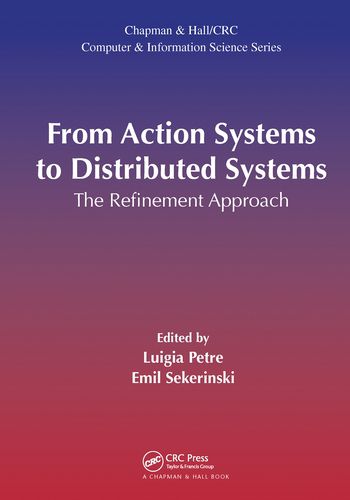Readings Newsletter
Become a Readings Member to make your shopping experience even easier.
Sign in or sign up for free!
You’re not far away from qualifying for FREE standard shipping within Australia
You’ve qualified for FREE standard shipping within Australia
The cart is loading…






Formal methods traditionally address the question of transforming software engineering into a mature engineering discipline. This essentially refers to trusting that the software-intensive systems that form our society’s infrastructures are behaving according to their specifications. More recently, formal methods are also used to understand properties and evolution laws of existing complex and adaptive systems-man-made such as smart electrical grids or natural ones such as biological networks.
A tribute to Professor Kaisa Sere’s contributions to the field of computer science, From Action Systems to Distributed Systems: The Refinement Approach is the first book to address the impact of refinement through a multitude of formal methods ranging from Action Systems to numerous related approaches in computer science research. It presents a state-of-the-art review on the themes of distributed systems and refinement.
A fundamental part of Kaisa Sere’s research consisted of developing Action Systems, a formalism for modeling, analysing, and constructing distributed systems. Within the design of distributed systems, Kaisa Sere’s main research focus was on refinement-based approaches to the construction of systems ranging from pure software to hardware and digital circuits.
Presenting scientific contributions from renowned researchers around the world, this edited book consists of five sections: Modeling, Analysis, Proof, Refinement, and Applications. Each chapter has been thoroughly reviewed by experts in the field. The book covers both traditional aspects in formal methods research, as well as current and innovative research directions. It describes the transition from the strong theory of refinement to a methodology that can be applied in practice, with tool support.
Examining industrial applications of the methods discussed, this book is a suitable resource for graduate students, researchers, and practitioners interested in using formal methods to develop distributed systems of quality.
$9.00 standard shipping within Australia
FREE standard shipping within Australia for orders over $100.00
Express & International shipping calculated at checkout
Formal methods traditionally address the question of transforming software engineering into a mature engineering discipline. This essentially refers to trusting that the software-intensive systems that form our society’s infrastructures are behaving according to their specifications. More recently, formal methods are also used to understand properties and evolution laws of existing complex and adaptive systems-man-made such as smart electrical grids or natural ones such as biological networks.
A tribute to Professor Kaisa Sere’s contributions to the field of computer science, From Action Systems to Distributed Systems: The Refinement Approach is the first book to address the impact of refinement through a multitude of formal methods ranging from Action Systems to numerous related approaches in computer science research. It presents a state-of-the-art review on the themes of distributed systems and refinement.
A fundamental part of Kaisa Sere’s research consisted of developing Action Systems, a formalism for modeling, analysing, and constructing distributed systems. Within the design of distributed systems, Kaisa Sere’s main research focus was on refinement-based approaches to the construction of systems ranging from pure software to hardware and digital circuits.
Presenting scientific contributions from renowned researchers around the world, this edited book consists of five sections: Modeling, Analysis, Proof, Refinement, and Applications. Each chapter has been thoroughly reviewed by experts in the field. The book covers both traditional aspects in formal methods research, as well as current and innovative research directions. It describes the transition from the strong theory of refinement to a methodology that can be applied in practice, with tool support.
Examining industrial applications of the methods discussed, this book is a suitable resource for graduate students, researchers, and practitioners interested in using formal methods to develop distributed systems of quality.